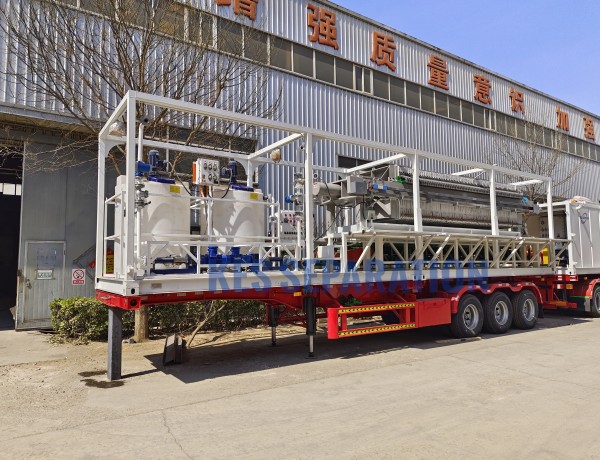

A water-based mud (WBM) dewatering unit is a specialized piece of equipment designed to remove excess water from spent WBM and thicken the remaining mud. This process is important in the drilling industry because it helps to reduce the amount of waste generated during drilling operations, as well as the costs associated with transporting and disposing of this waste.
The process of dewatering and thickening WBM typically involves the use of a centrifuge or a filter press. A centrifuge works by spinning the spent WBM at high speeds, causing the solids to separate from the water. The solids can then be removed and further processed or disposed of as needed. A filter press, on the other hand, uses a series of plates and filters to separate the solids from the water, resulting in a thicker, drier mud.
There are several factors to consider when choosing a WBM dewatering unit, including the volume of spent mud to be processed, the type and size of equipment required, and the specific needs of the drilling operation. It's important to work with a knowledgeable supplier who can help you choose the right equipment and provide support throughout the dewatering process.
KES SEPARATION is reliable equipment manufacturer & turnkey solution provider in WBM dewatering unit. We have rich experience both in dewatering unit with centrifuge and dewatering unit with Filter Press. Recently, we completed the order from our overseas customer. They ordered Dewatering unit with Filter Press because they already tried to treat the spent WBM with Filter Press solutions and it worked very well.


WBM dewatering unit with Filter PRESS VS WBM dewatering unit with Centrifuge
WBM dewatering units are commonly used in the oil and gas drilling industry to separate the drilling mud from solids. The choice between a filter press and a centrifuge depends on several factors, including the nature of the drilling mud, the required separation efficiency, and the available budget. Here are some of the advantages and disadvantages of using WBM dewatering unit with a filter press versus a centrifuge.
Advantages of WBM dewatering unit with Filter Press:
1) Low operating cost: Filter presses require less energy to operate than centrifuges, which can result in lower operating costs.
2) Easy to operate: Filter presses are relatively simple to operate and require minimal maintenance.
3) High separation efficiency: Filter presses have a higher separation efficiency than WBM dewatering units with centrifuges, which means that they can remove a higher amount of solids from the drilling mud.
Disadvantages of WBM dewatering unit with Filter Press:
1) Limited capacity: Filter presses have a limited capacity compared to centrifuges, which can result in longer processing times.
2) Filter cloth cost: Filter presses require filter cloth, which can be expensive and may require frequent replacement.
Advantages of WBM dewatering unit with Centrifuge:
1) High processing capacity: Centrifuges can process a larger volume of drilling mud than filter presses, resulting in faster processing times.
2) Higher separation efficiency: Centrifuges have a higher separation efficiency than WBM dewatering units with filter presses, which means that they can remove a higher amount of solids from the drilling mud.
3) Dry solids disposal: The solids that are separated from the drilling mud through the centrifuge are dry and can be easily disposed of.
Disadvantages of WBM dewatering unit with Centrifuge:
1) High operating cost: Centrifuges require more energy to operate than filter presses, which can result in higher operating costs.
2) High maintenance: Centrifuges require more maintenance than filter presses, which can result in higher maintenance costs.
3) Complex operation: Centrifuges are more complex to operate than filter presses and require a higher level of expertise.
In conclusion, the choice between a filter press and a centrifuge for a WBM dewatering unit will depend on several factors. Filter presses are suitable for smaller volumes of drilling mud and offer lower operating costs, while centrifuges are suitable for larger volumes of drilling mud and offer higher separation efficiency. The choice between the two will depend on the specific requirements of the drilling operation and the available budget.